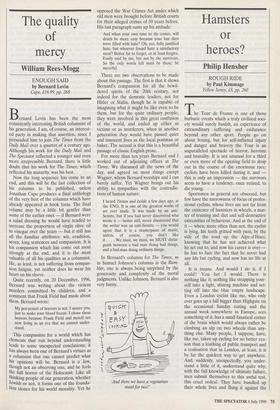The quality of mercy
William Rees-Mogg
ENOUGH SAID by Bernard Levin Cape, £16.99, pp. 268 Bernard Levin has been the most consistently interesting British columnist of his generation. I am, of course, an interest- ed party in making that assertion, since I persuaded him to join The Times from the Daily Mail over a quarter of a century ago. Although his work for the Daily Mail and The Spectator reflected a younger and even more irrepressible Bernard, there is little doubt that his work for The Times, which reflected his maturity, was his best.
Now the long sequence has come to an end, and this will be the last collection of his columns to be published, unless Jonathan Cape produces a final anthology of the very best of the columns which have already appeared in book form. The final volume may be a little bit gentler than some of the earlier ones — if Bernard were a salad dressing he would have tended to increase the proportion of virgin olive oil to vinegar over the years — but it still has all the familiar attributes: wit, erudition, scorn, long sentences and compassion. It is his compassion which has come out most strongly at the end, and it is the most valuable of all his qualities as a columnist. He, as least, is not suffering from compas- sion fatigue, yet neither does he wear his heart on his sleeve.
Quite recently, on 20 December, 1996, Bernard was writing about the violent murders committed by children, and a comment that Frank Field had made about them. Bernard wrote:
My pot-pourri of horrors is not, I assure you, just to make your blood freeze. I chose these horrors because Frank Field and myself are now living in an era that we cannot under- stand.
This compassion for a world which has elements that run beyond understanding leads to some unexpected conclusions; it has always been one of Bernard's virtues as acolumnist that one cannot predict what his opinions will be. Bernard is a Jew, though not an observing one, and he feels the full horror of the Holocaust. Like all thinking people of our generation, whether Jewish or not, it forms one of the founda- tion stones for his world morality. Yet he opposed the War Crimes Act under which old men were brought before British courts for their alleged crimes of 50 years before. His last paragraph sums up his attitude:
And when your own time to die comes, will death be more easy because your last days were filled with hate? Oh, yes, fully justified hate, but whoever found hate a satisfactory meal? Better far to forget, or at least forgive. Easily said by me, but not by the survivors. So the only words left must be these: be merciful.
There are two observations to be made about this passage. The first is that it shows Bernard's compassion for all the bewil- dered spirits of the 20th century, not indeed for the demonic leaders, not for Hitler or Stalin, though he is capable of imagining what it might be like even to be them, but for the quite ordinary people; they were involved in this great confusion of the world, and ended up either as victims or as murderers, when in another generation they would have passed quiet and innocent lives as the local postman or baker. The second is that this is a beautiful passage of classic English prose.
For more than ten years Bernard and I worked out of adjoining offices at The Times. We discussed all the news of the day, and agreed on most things except Wagner, whom Bernard worships and I can barely suffer. Yet Wagner brings out his ability to sympathise with the contradic- tions of human nature: I heard Tristan and Isolde a few days ago, at the ENO. It is • one of the greatest works of art ever made. It was made by an anti- Semite, but if you had never discovered who wrote it — better still, never discovered that the writer was an anti-Semite — you would agree that it is a masterpiece of music, unless, of course, you don't like it . . . . We must, we must, we MUST distin- guish between a bad man doing bad things, and a bad man doing ordinary things.
In Bernard's columns for The Times, as in Samuel Johnson's columns in the Ram- bler, one is always being surprised by the generosity and complexity of the moral judgments. Unlike Johnson, Bernard is also very funny.
And there we have a vegetarian meal for two!'














































































































 Previous page
Previous page